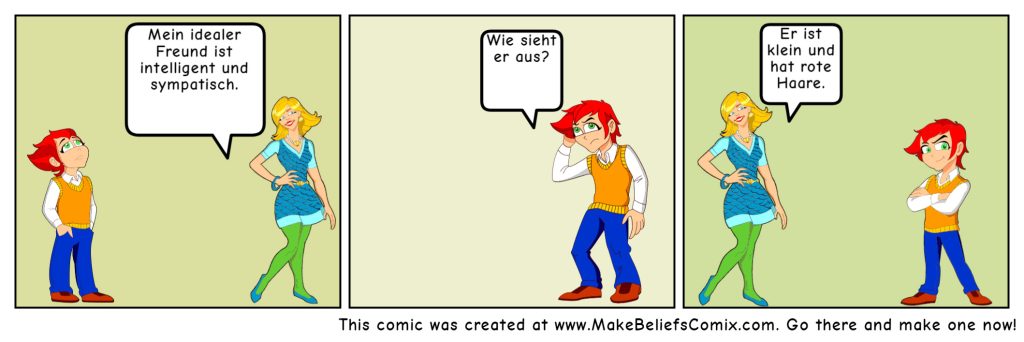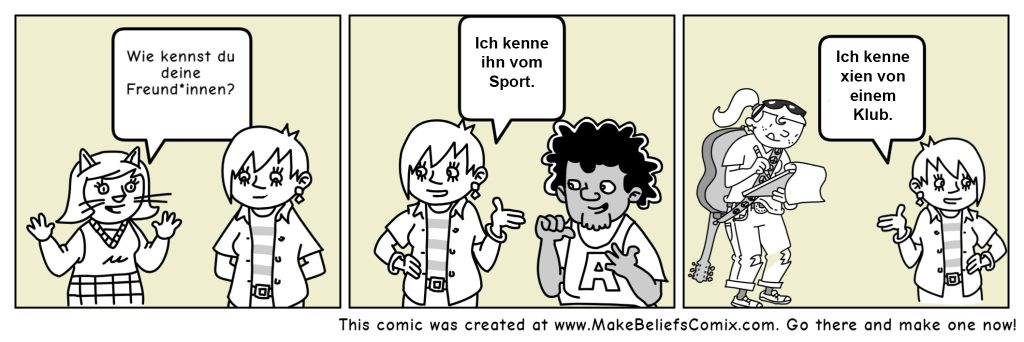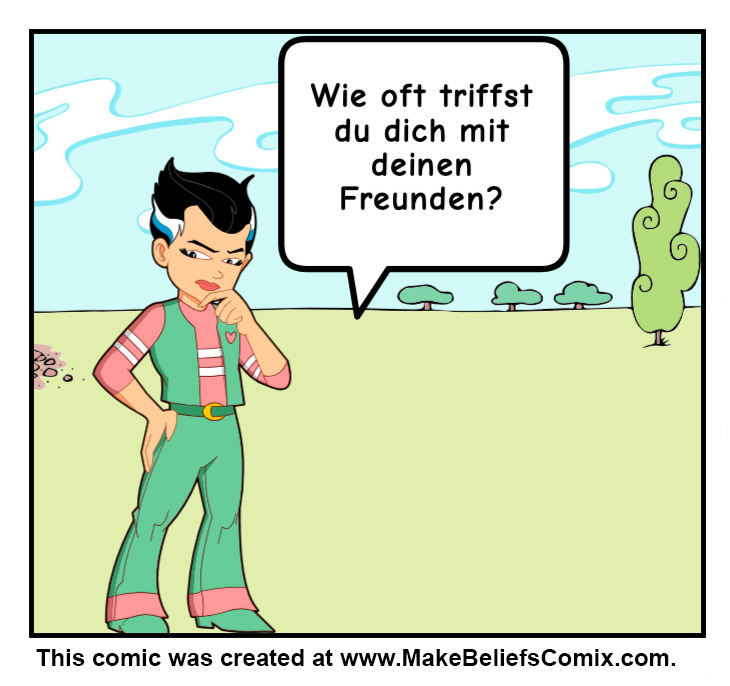4.4 Mein Freundeskreis an der Uni

Guten Tag!
Zum Aufwärmen machen wir unseren Tagesminiplausch und eine Wiederholung.
Wiederholung
In the previous lesson, you learned how to ask about a person’s relationship status, how to describe your own status, and how to describe your ideal partner. Let’s review.

In your written journal describe one relationship that you have with another person. Perhaps it is a good friend or a romantic partner. Now write a sentence that describes your ideal partner. Finally read your sentences aloud for your audio journal.
Lektionsüberblick
Are you the kind of person with a large group of friends who hang out occasionally? Or do you have a much smaller group of friends (klein aber fein = small but refined), who do everything together? In this lesson, we will talk about your circle of friends at UW or wherever you reside. In the end, you will be able to 1) say how you know your friends at UW, 2) ask someone about their friends, and 3) ask someone how often they hang out with their friends.
Was weißt du schon?
Before you begin take a moment to check your current skill level. Be sure to click through to each question.
| Noch nicht start klar?
Du kannst immer auf die gleiche 1010-Lektion zurückgreifen! |
Not confident about starting this lesson?
You can always review the same Lektion from 1010. |
1)Wie/Woher kennst du deine Freund*innen?

You have seen the questions words Wie and Woher before (Think: Wie geht’s dir? Woher kommst du?) Can you tell that these question words would both work in order to elicit information about how you know your friends? Listen to the questions and repeat.
You’ve learned how to use several question words (wie, woher, wo, etc.). Now it’s time for one more: Wie viele? See if you can guess what is means based on the questions and answers below.
| Wie viele Freunde hast du? | Ich habe drei gute Freunde. |
| Wie viele Schwestern hast du? | Ich habe zwei Schwestern. |
| Wie viele Katzen hast du? | Ich habe keine Katzen. |
| Wie viele Hunde hast du? | Ich habe einen Hund. |
Let’s practice.
🎥For examples of questions with wie viele, you can watch this Learn with Anja video (watch from time stamp 3:46-4:34).
Remember that after you answer someone’s question, you can always use die magische Frage (the magical question) in response: und du? You can review that here.
Kleiner Hinweis
You might recall from your work with the alphabet that the German letter W makes the V sound when you see it in a word. This means Wie is pronounced like VEE. Next, for the word viel/viele, remember that the letter V is pronounced a lot like the English F (so think FEEL). So all together it sounds like this:
Jetzt bist du dran!
3) Wie oft?
Sofia would also like to know how often you hang out with your friends. She asks:
 |
First practice saying Sofia’s question aloud. Then review some possible responses.
Let’s practice some more.
Kleiner Hinweis
Jetzt bist du dran!
Zum Schluß

*As you conclude this lesson, don’t forget to check Canvas!*

Media Attributions
- 4.3_3 comic file-66fd6bc0910d7 © This comic strip was generated at http://www.MakeBeliefsComix.com. Used by permission of author and site creator Bill Zimmerman.
- 4.4-ii-Ich-kenne-meine-Freunden-2048×684 © This comic strip was generated at http://www.MakeBeliefsComix.com. Used by permission of author and site creator Bill Zimmerman.
- Gepäckwagen by Stefan Plogmann, BY CC NC SA 3.0
- 4.4_3 sofia wie oft make-beliefs-comix


